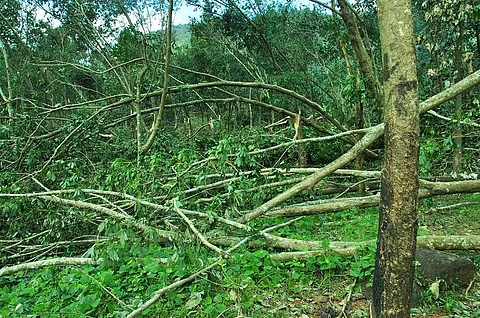

Amongst the devastation that Cyclone Ockhi has left behind, crops in Kanyakumari district plantations have been extensively damaged. Rubber plantations took the biggest hit, followed by banana plantations and spices, leaving the farmers and plantation owners in the area reeling.
The government hasn’t concluded on the official figures of the loss of plantations and surveys are still going on, claims a source from the Agriculture Department.
Kanyakumari district has a huge green cover with 30% of the total geographical area covered by forests. Banana plantations, rubber, cloves and pepper are some of the primary produce grown in the area.
The district is set to face an unprecedented setback to its economy since a large part of the district’s revenue is dependent on rubber plantations.
The Managing Director of the government rubber corporation, Nagercoil says, “In the areas under the government’s Arasu Corporation alone, the loss will amount to Rs 26 crore. The loss of revenue will have a significant impact on the district’s economy.”
Severe blow to rubber planters
Private rubber planters are one of the most affected communities due to Ockhi. With a financial loss to the tune of a hundred crore and the number of fallen rubber trees amounting to more than 2 lakh, the district will face a huge drop in the rubber production in the coming years.
A member of the Kanyakumari Planter’s Association says, “Almost all the rubber planters have lost 60-70% of our yield to Ockhi. In my estate alone I have lost 6,000 trees out of the total 10,000.” His estate is in Palkulam, one of the most affected areas. His financial loss will amount to a crore, he claims.
Many estate owners are distraught about their losses. Rubber plants usually need an idle period of seven years before the yield. They feel seven years of their production cost and the yield has gone down the drain, ripping them of a huge income.
An absent government and red-tapism
Many plantation owners and rubber planters are disgruntled with the government for its absence.
An estate owner in the Maaramalai region says, “Till date, we’ve had no government official visiting the area for an assessment of our loss. Even after three weeks, electricity has not been restored in some of the regions.”
After Ockhi, the roads were riddled with fallen trees for up to 20 km, blocking access to their estates. The roads have been cleared since then.
Cut rubber trees have value in the market only for a certain period of time after which they can be used only for firewood.
“Rubber wood has value only as long as it retains the dampness in the trunk. After the wood dries, the value drops drastically,” says the estate owner. However, transporting trees from estates which come under the Private Forest Act needs the DFO’s approval before they can be cleared, which is leading to red tape, he says.
Abysmally low compensation
While the government has promised compensation for the crop loss, it has done nothing to lift their spirits.
“The government’s compensation is abysmally low. It won’t tide over even 5% of our losses,” says a plantation owner who lost his entire crop of 60,000 plantains in the Arumanallur area to Ockhi.
The government has sanctioned Rs 50,000 for a hectare of rubber plantation and Rs 48,500 for a hectare of banana plantations.
Speaking to TNM, MLA Mano Thangaraj of the Padmanabhapuram constituency says, “There’s no logic behind the government’s compensation figure. A thorough understanding of the production cost of the crops must be done before they declare the compensation amount.”
Governmental inaccuracies
“There is a huge discrepancy between the government figures and the actual numbers. In the preliminary report, only 1,500 trees were accounted for, which is absolutely nonsensical. The number will easily add up to seven lakh fallen trees in the district. In my constituency alone, two lakh trees have been lost to Ockhi,” alleges the MLA.
He adds that the government report has grossly underestimated the severity of the calamity.
Accusing the government of playing truant, Thangaraj says no scientific assessment of the loss was done to arrive at the actual figure. The numbers were merely for an obligatory report which has no basis in reality.
“When the officials haven’t even done the ground visit, I don’t understand how they gave their reports to the government,” says the frustrated MLA.